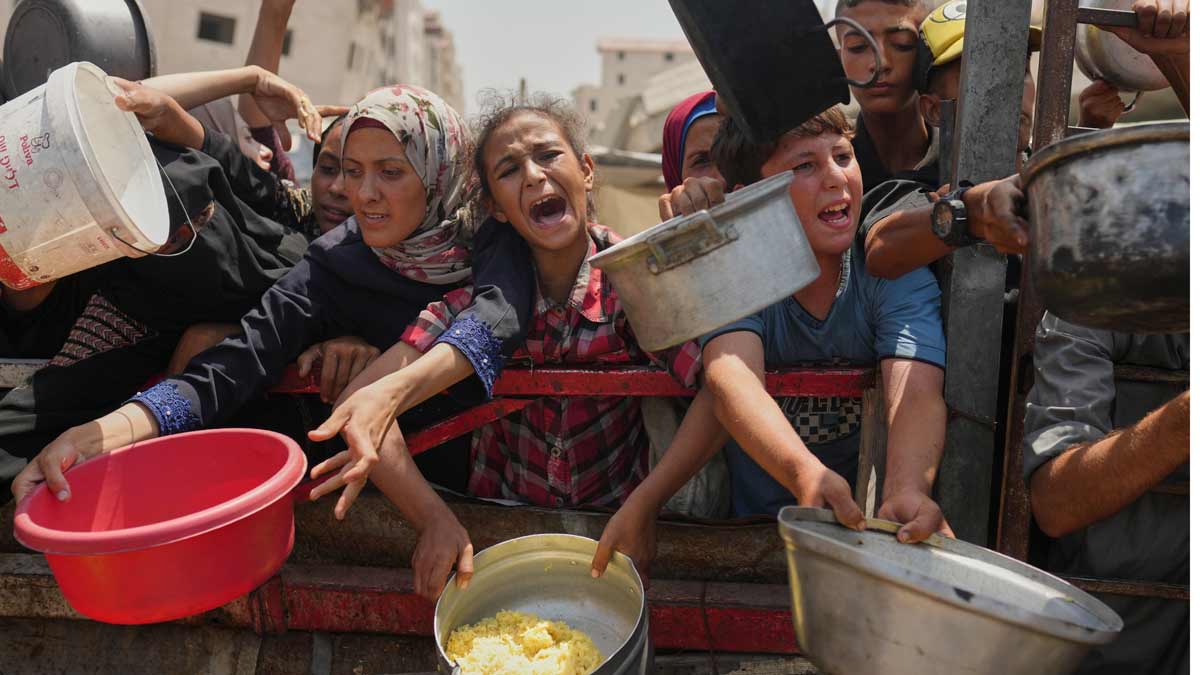Medical aid for Gaza's children at risk as US stops issuing visitor visa after Laura Loomer's campaign
 Palestinians struggle to get donated food at a community kitchen in Gaza City, northern Gaza Strip | AP
Palestinians struggle to get donated food at a community kitchen in Gaza City, northern Gaza Strip | AP
The United States has stopped issuing visas for people from Gaza, a move that has raised alarm among charities and medical organisations. The State Department said it would also carry out a full review of the procedures for granting “medical-humanitarian” visas, which it described as a very limited category.
These visas have served as a lifeline for seriously injured children from Gaza who were brought to the United States for treatment that was otherwise unavailable. The decision has come within weeks of France launching an investigation into its visa process for Palestinians. The French move was prompted by the actions of a Palestinian student who posted antisemitic material on social media.
For more than a year, American and international charities have been organising medical evacuations of children caught in the war. One of the most prominent groups is HEAL Palestine, an Ohio-based nonprofit founded in 2024. The organisation has overseen what it called the single largest evacuation of injured children from Gaza to the United States. In addition to flying children to American hospitals, it has been operating food kitchens in the enclave.
By its latest count, HEAL Palestine has evacuated 63 children, including 11 between the ages of six and fifteen who were sent to hospitals in nine American cities. Many had lost limbs or suffered severe injuries from bombings. Volunteer doctors described complex cases of orthopaedic trauma and burns, often worsened by malnutrition. Another charity, the Palestine Children’s Relief Fund, has reported bringing nearly 170 children out of Gaza in the past year, some to the United States and others to countries willing to provide specialised care.
The State Department’s abrupt decision followed a campaign by Laura Loomer, a far-right activist known for her anti-Islamic views. Although she holds no formal position in government, she is regarded as having considerable influence over Trump administration policies.
Earlier this month, Loomer discovered that medical flights were arriving in the United States with injured Palestinian children. She began posting about them heavily on social media, calling the arrivals a “national security threat” and accusing groups like HEAL Palestine of being linked to Hamas, despite offering no evidence.
Her posts targeted flights landing in San Francisco, St Louis, San Antonio and Houston. She shared videos of children arriving at airports, some celebrating in relief, but falsely described their cries of joy as “jihadi chants”. In another post she called them “Islamic invaders from an Islamic terror hot zone”.
Loomer tagged state and federal officials, including Secretary of State Marco Rubio, demanding explanations about why visas had been issued to people from what she called a “Hamas hot zone”. She later claimed credit for the visa halt, thanking Rubio for intervening.
The rhetoric has horrified aid workers and former officials who dealt with Middle East policy.
Andrew Miller, a senior State Department official in the previous administration, dismissed suggestions of a security risk as baseless. He pointed out that Gazans seeking to travel to the United States could only do so after passing multiple layers of checks. They must first be cleared by the Israeli military and security services simply to leave Gaza. They then need to appear in person at a US embassy in Jerusalem, Cairo or Amman, where they undergo further scrutiny before any visa is granted. Experts at the Migration Policy Institute also questioned the logic of the halt, noting that people arriving for urgent medical care posed no plausible security concern.
Human rights groups and medical charities have condemned the suspension. Edward Ahmed Mitchell of the Council on American-Islamic Relations described it as sheer cruelty that would put more children’s lives at risk. He argued that the United States has a moral obligation to extend treatment in such circumstances. The Palestine Children’s Relief Fund said the decision would have a devastating effect on its ability to provide care. Critics have also drawn historical parallels, suggesting that this kind of exclusion echoes earlier episodes when refugees fleeing persecution were turned away.
The policy change comes at a time when Gaza is facing catastrophic humanitarian conditions. Since October 2023, more than 60,000 Palestinians have been killed, with thousands more maimed. Food shortages are widespread and the United Nations has warned that famine conditions are taking hold. Nearly a lakh women and children are believed to be suffering acute malnutrition. Against this backdrop, medical evacuation programmes have been a rare source of hope for families with children requiring advanced care.
Middle East